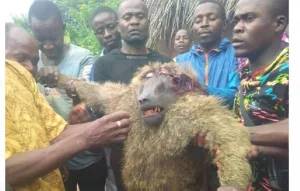A harrowing incident unfolded in Mayo-Banyo, where a man engaged in a vicious battle with a chimpanzee, resulting in the primate's death and severe injuries to the human. According to eyewitnesses, the confrontation was intense, highlighting the dire consequences of human-wildlife conflict. The man, currently receiving treatment at a local hospital, is fortunate to have survived the ordeal. This tragic event raises critical questions about the delicate balance between human economic development and the preservation of great apes. As primatologists strive to find answers, the stark reality remains: human activities are rapidly destroying the natural habitats of gorillas, bonobos, chimpanzees, and orangutans.
Human-Wildlife Conflict: A Growing Concern
The coexistence of humans and wildlife has long been a contentious issue. As forests succumb to deforestation, agriculture, and urbanization, the boundaries between humans and animals continue to blur. This proximity often leads to devastating consequences for both parties. In this instance, the chimpanzee's demise serves as a poignant reminder of the urgent need for sustainable solutions. Can economic progress and great ape conservation be reconciled? This pressing question demands attention from policymakers, conservationists, and local communities.
The Plight of Great Apes
Gorillas, bonobos, chimpanzees, and orangutans face unprecedented threats due to:
1. Habitat destruction and fragmentation
2. Poaching and hunting
3. Disease transmission from humans
4. Climate change
As their populations dwindle, the international community must acknowledge the intrinsic value of these majestic creatures and the ecosystems they inhabit.
A Call to Action
To mitigate human-wildlife conflict and ensure the survival of great apes, we must:
1. Promote sustainable land-use practices
2. Support conservation efforts and protected areas
3. Engage local communities in wildlife preservation
4. Foster education and awareness about human-wildlife coexistence
The Mayo-Banyo incident serves as a stark reminder of the stakes. It is imperative that we reconcile economic development with great ape conservation, prioritizing the well-being of both humans and animals. Only through collective action can we safeguard the future of these incredible species and the ecosystems they call home.




No comments yet
Be the first to share your thoughts!